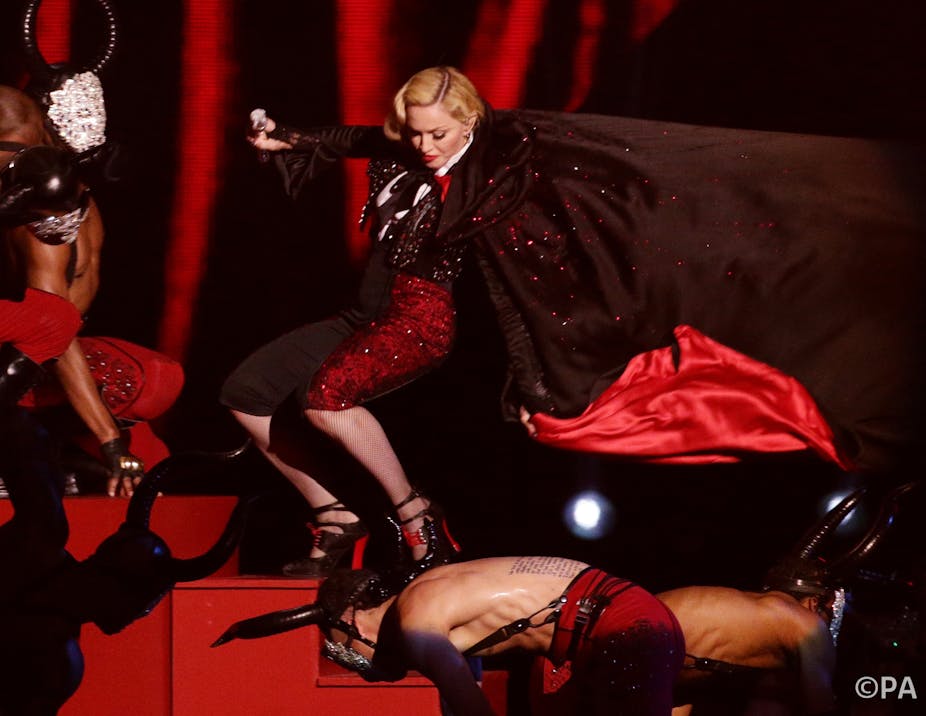So, Madonna fell over at the Brit Awards. If you weren’t watching last night (and if you were, why?) then no doubt you know by now. The tumble has been gleefully reported from all quarters – something that says a lot about how dull the Brits Awards are. The other option is to talk about how Sam Smith and Ed Sheeran won accolades. Who cares? The answer will always be, the UK music industry, because this is their celebration.
The 2015 Brit Awards is a significant event in the UK music calendar. But probably only if you are in the industry. As we all know, such awards ceremonies are simply marketing exercises – with the Oscars as their template, they draw media attention to the successes produced by a particular industry.
The problem is that word “industry”. Musicians need companies to consolidate and increase their own efforts in establishing (and monetising) fan-bases. Because they do, they work on the terms and conditions of the companies whose investment they need. On this basis, the Brit Awards are a celebration of the type of person and the type of music that companies make successful. So the exercise is always a self-congratulatory one – and that often makes for difficult watching.
The Brit Awards always plays safe, to the extent that one year blurs into another – a procession of lairy rock lads swagger up, giving and receiving laddish banter as they tuck away another endorsement for their safe, essentially middle-of-the road music. Occasionally a female face, and less often a black face (rarely a female one) makes an appearance, but all are bound by the strict rules of “celebrity” culture. Along the way, music gets lost.

So where do you find the music that is musically innovative and distinctive in any one year? It could be argued that the Mercury Awards is the arena for evaluating and celebrating musicality, yet the flaw to that argument is that the acts that tend to come to the attention of the Mercury judges are industry successes in the first place, albeit they come from across a wider range of genres than Brit Awards nominees tend to be derived from.
It was frustration with the Brits that provoked the creation of the MOBO awards. The MOBOs celebrate black talent and artistry. It would take an article longer than this one to identify just why the Brits finds it so hard to engage intelligently with all of the music that generates interest and excitement in the UK but perhaps switching to a formula that tracks downloads and streams might help to open up the Brits to genres beyond the safe and familiar ones they are preoccupied by.
Yet, somehow, this narrow preoccupation is just as it should be. What music industry produces is a symbolic good, a commodity. Music at its core, but it is sold as a composite of the way a musician sounds and the way that he or she looks and behaves, and articulates and inserts themselves in contemporary value-sets. Musicians act as lightning rods for popular culture and, if popular culture goes on being expressed through soaps and reality TV shows and football and gossip and scandal, then the Brit Awards is about celebrating which musicians are most efficient at producing the soundtrack for such a culture.
If there is a lack of diversity in the types of musicians celebrated it is because the types of music made by those musicians are the ones that fit most readily with the expectations of general audiences. Or, perhaps more accurately, the musicians awarded are the ones who help people negotiate a way of life they do not control by providing an escapist, celebratory soundtrack for an idealised escape from daily life – which raises the question of why the need to escape is felt so strongly by so many.
“Control” is the key word here, earlier popular music scenes – folk, rock, punk rock, the rave scene – were very much about young people expressing and embodying “alternative” values. As opportunities to enjoy careers have contracted, so too, in a perplexing way, has the belief that there are other ways of existing; other ways of realising the self – and pop music was always particularly good at articulating and focusing this.
“Daily life” for many people in the UK is an increasing struggle: the collapse of community attendant on the collapse of manufacturing industries has forced individuals to become “self-marketers”. It should be little wonder, then, that singers who sing wistful ballads of vulnerability and self-struggle – among them Sam Smith and Ed Sheeran – should prove so popular. And when community is recomposed at the level of football and partying then nominees such as Mark Ronson and Duke Dumont provide the EDM and House soundtrack for those “mad for it” collective occasions.
The Brit Awards is about celebrating music’s contribution to popular culture. Its lack of diversity reflects a lack of diversity in the experiences for the majority of, especially young, people in a “free-market” economy.

